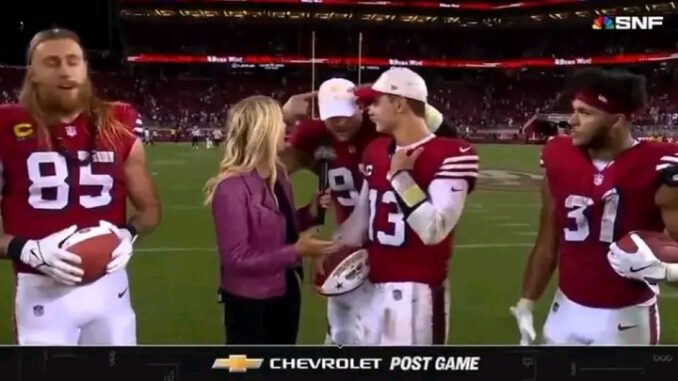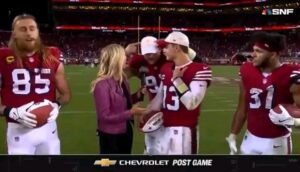
NFL Fines 49ers DE Nick Bosa $11,255 for Wearing MAGA Hat During Postgame Interview
In a development that has captured headlines across the sports world, the NFL has fined San Francisco 49ers defensive end Nick Bosa $11,255 for wearing a “Make America Great Again” (MAGA) hat during his postgame interviews on NBC last Sunday night. The NFL cited its policies on maintaining a neutral stance in regard to political messaging during official league events as grounds for the fine. Bosa’s decision has sparked a significant conversation regarding political expression among professional athletes, raising questions about the NFL’s policies, the role of personal beliefs in sports, and the broader societal implications of political messaging in high-profile spaces.

Bosa, a prominent player known for his impact on the field and his outspoken nature off it, appeared unbothered by the fine, telling reporters that he knew the NFL might impose a penalty but went forward anyway, believing it was “worth it.” In his remarks, Bosa emphasized his right to express his views and stated that he felt athletes should have the freedom to convey their beliefs, even on a stage as visible as a nationally televised postgame interview.
This move has set off a firestorm of reactions among fans, media outlets, and fellow athletes, sparking debates over the line between personal expression and professional expectations in the world of sports. Here’s a closer look at the details of the fine, the reasoning behind Bosa’s actions, the NFL’s stance, and the varied reactions it has inspired.
The Details of the Fine and the NFL’s Stance on Political Neutrality
According to the NFL’s statement, Bosa’s choice to wear the MAGA hat during the postgame interview on NBC was viewed as a breach of the league’s policies, which require players and personnel to maintain a politically neutral appearance during official events. This policy is intended to ensure that the NFL remains a unifying space for fans of all backgrounds and beliefs, rather than a platform for promoting political affiliations.
The $11,255 fine was assessed as part of the league’s commitment to this standard. Although the NFL has historically encouraged players to express themselves and their identities, the policy around visible political messaging during televised events is more stringent, as the league has sought to avoid the potential divisiveness that political symbols can bring to such a broad audience.
Bosa’s Stance: “It Was Worth It”
Bosa’s decision to wear the MAGA hat came as no surprise to fans familiar with his social media presence and previous statements. He has been vocal about his support for conservative values and has shared posts that align with his political beliefs. His wearing of the hat—a well-known symbol of former President Donald Trump’s campaign slogan—was a statement of his views, one that he knew might come with a financial cost.
Speaking to reporters following the game, Bosa did not shy away from discussing his decision. “I knew the NFL might fine me,” he stated, “but I felt like this was something I wanted to do. I think it’s important for athletes to be able to express who they are and what they believe, and for me, this is a part of that.” He further elaborated that the fine, though substantial, was “worth it” because it allowed him to be true to himself.

This isn’t the first time Bosa has attracted attention for his views. Prior to joining the NFL, he made headlines for his outspoken social media posts supporting conservative positions. Although he deleted some of those posts before entering the draft, his beliefs have remained a known aspect of his public image.
Fan and Media Reactions: A Divided Response
The decision to fine Bosa, along with his choice to wear the MAGA hat, has drawn a wide range of reactions. Fans and media figures have taken to social media to voice their opinions, with responses split between those who support Bosa’s right to express his beliefs and those who believe he crossed a line.
Supporters of Bosa argue that athletes, like all individuals, should be free to express their political beliefs. Many see Bosa’s decision as an example of courage, noting that he willingly accepted the consequences of his actions and stayed true to his convictions. “Athletes are people too,” wrote one fan on Twitter. “They should be able to say what they believe without fear of punishment. Bosa is standing up for his views, and that’s something to admire.”
On the other side, some fans and commentators have criticized Bosa’s actions, arguing that a postgame interview on national television is not the appropriate time or place for political statements. They contend that sports should serve as a space that unites people, free from the contentious issues that divide society. “I watch football to escape politics, not to have them forced on me,” commented another fan. “Bosa needs to realize that he represents more than just himself when he’s in uniform.”
The NFL’s Complex Relationship with Political Expression
The NFL has long grappled with the role of political expression within the league, particularly in light of recent events and societal movements. The topic became especially prominent with Colin Kaepernick’s 2016 protest, when the then-49ers quarterback kneeled during the national anthem to protest racial injustice. Kaepernick’s protest led to widespread debates about patriotism, free speech, and the role of athletes in advocating for social issues.
In recent years, the NFL has adopted various initiatives aimed at addressing social justice, supporting causes such as racial equality, and promoting community service. However, the league has simultaneously maintained policies intended to keep official appearances and game-related events politically neutral, as seen in this instance with Bosa. This approach reflects the delicate balance the NFL seeks to achieve—encouraging players to express themselves while trying to prevent overt political endorsements during games.

Bosa’s situation highlights the complexities and nuances the NFL faces in enforcing these policies. While the league wants to provide a platform for players to voice their views, it also has an interest in preserving the game as a source of entertainment that appeals to fans of diverse beliefs. Given the divisive nature of politics in the United States, the league faces ongoing challenges as it navigates where to draw the line.
Bosa’s Teammates and the 49ers Organization React
Inside the 49ers organization, reactions to Bosa’s decision have been largely supportive, though players and coaches have avoided making political statements themselves. Coach Kyle Shanahan addressed the issue during a press conference, affirming that while the team values its players’ individuality, he also understood the NFL’s policies. “Nick is a fantastic player and a key part of our team,” Shanahan said. “He’s got a right to his views, and I respect that, but we also respect the league’s stance and policies.”
Teammates, while not addressing the political aspect directly, spoke highly of Bosa’s commitment to the team. One 49ers player, who asked to remain anonymous, commented, “Nick has always been someone who’s not afraid to speak his mind. We’re all professionals here, and I think we respect each other regardless of our views.”
The Broader Implications: Athlete Activism and the Future of Political Expression in Sports
Bosa’s fine and the subsequent reactions underscore the ongoing discussion around athlete activism and political expression in professional sports. The role of athletes as public figures has evolved, with players increasingly using their platforms to advocate for social, political, and environmental causes. High-profile stars across various leagues, from LeBron James in the NBA to Megan Rapinoe in women’s soccer, have spoken out on issues they care about, using their visibility to bring attention to causes and movements.
Bosa’s situation brings a unique angle to this trend. Unlike many athletes who have used their platforms to advocate for progressive or social justice causes, Bosa’s expression is tied to conservative values and the symbolism associated with the MAGA hat. His choice reflects a shift toward athletes voicing a range of perspectives, challenging the narrative that athlete activism is solely linked to specific ideological causes.
However, the NFL’s decision to fine Bosa also illustrates the constraints that exist within professional sports. While some leagues have embraced player expression more fully, the NFL has maintained a level of control, especially in situations where a player’s actions intersect with televised events or official appearances. This approach has sparked discussions over the role of free speech within sports, with some questioning whether fines for such actions are consistent with the First Amendment, even though private organizations like the NFL have more leeway in enforcing conduct standards.
Public Figures Weigh In: Opinions from Across the Spectrum
Several prominent figures from both the sports and political worlds have weighed in on the controversy. Conservative commentators praised Bosa for standing by his beliefs and argued that the fine represents a double standard. “If it’s okay to support one side, it should be okay to support the other,” tweeted one political commentator. “Bosa is a patriot, and he should be able to wear whatever he wants.”
Conversely, some voices in the sports media have supported the NFL’s stance, suggesting that the league is right to enforce a standard of neutrality, particularly in highly visible settings. “The NFL is entertainment, not a political rally,” argued a prominent sports columnist. “Fans come from all walks of life and deserve a space where politics are left at the door. The NFL has every right to enforce that.”
Looking Ahead: Will the NFL Reevaluate Its Policies?

The controversy surrounding Bosa’s fine raises questions about how the NFL will handle similar situations in the future. As the league seeks to maintain a broad fanbase and promote inclusivity, it may be forced to reconsider its policies on political expression, particularly as societal expectations around free speech and individual rights evolve. The balancing act between supporting players’ freedom of expression and maintaining a politically neutral image is likely to remain a challenge.
As of now, the NFL has not indicated any plans to revisit its policies. However, with athlete activism
Leave a Reply